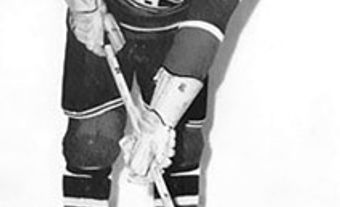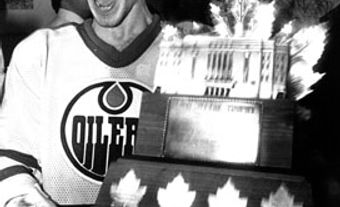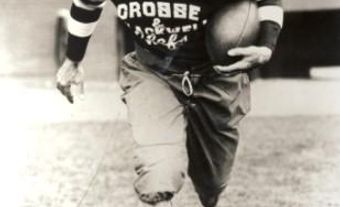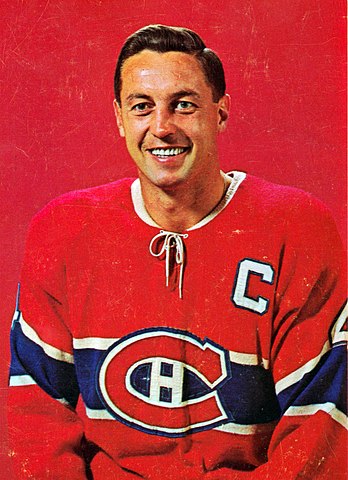
Family and Childhood
Jean Béliveau was born in Trois-Rivières, the eldest of eight children of Arthur and Laurette Béliveau, who were of Acadian descent. (His father’s ancestors settled in Nova Scotia in the mid-17th century, then near Boston after the Acadian expulsion, and finally in Quebec in the mid-19th century.) When Béliveau was six years old, his family settled in Victoriaville, Quebec. He received his first pair of skates that year as a gift from his father, who worked for the Shawinigan Water and Power Company.
Jean, his siblings and their neighbours spent their childhood winters on the Béliveaus’ backyard ice rink. The winter was one long game of shinny, a constant stream of children eager to play every chance they had. Béliveau remembered being called in for lunch and not even removing his skates before heading outside again.
In 1943, at the age of 12, Béliveau began playing organized house league hockey. Three years later, at 15, he was playing for the College de Victoriaville. Béliveau also excelled in baseball as an infielder and pitcher and turned down an offer to play for a minor league team in Alabama when he was 16.

Junior and Amateur Hockey Career
Béliveau then focused solely on hockey, joining the Quebec Citadelles, a junior hockey team. During the 1949–50 season, he scored 35 goals and 45 assists, second-best in the league. He made brief appearances for the Montreal Canadiens in 1950 and 1951 and performed well both times, but he was reluctant to play professionally. Following Béliveau’s second stint with the Canadiens, Maurice Richard said, “He’s great. He’s got the greatest shot I’ve ever seen in hockey and he’s a fine man. He could help this team plenty and I wish he would change his mind.”
For the 1951–52 season, Béliveau signed with the Quebec Aces, a senior franchise. He played alongside Herb Carnegie, who became his mentor and lifelong friend. It was with the Aces that Béliveau earned the nickname “Le Gros Bill,” after the 1949 film of the same name starring actor Yves Henry, whom Béliveau resembled. Béliveau reportedly earned around $20,000 a year between his salary and endorsements, despite playing with an amateur team. He attracted so much attention that when the Colisée de Québec was constructed it became known as "The House that Béliveau built" because of the huge crowds he drew.
However, the Montreal Canadiens continued to aggressively court him. General manager Frank Selke asked Béliveau to sign the standard NHL “C Form,” which would have outlined the terms of his career with the Canadiens, including start date and salary. On the advice of his father, who didn’t want his son to “sign anything that allows someone else to control his life,” Béliveau signed a “B Form,” which committed him to Montreal should he ever decide to play hockey professionally.
In a dramatic move, the Canadiens bought the entire Quebec Senior Hockey League, turned it professional and called up Béliveau. When he signed with the team in 1953, it was for an unprecedented $105,000 over five years. The contract was also the first multi-year deal given to a newcomer by the Canadiens.
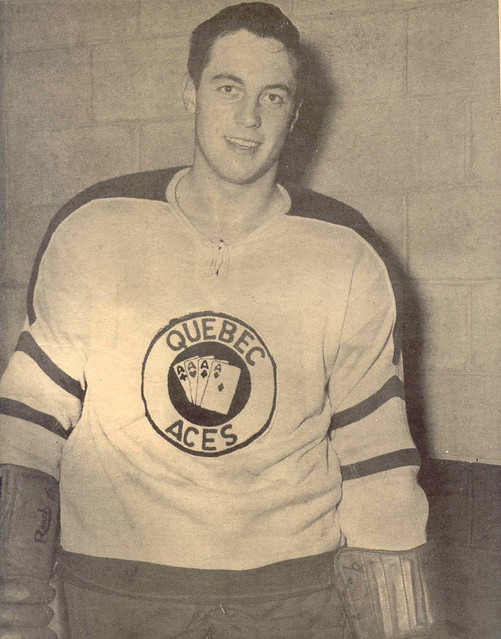
NHL Career
Béliveau was both exceptionally large for his era — 6’3” and 205 pounds — and adroit. A centre, he was a deceptively fast skater with exceptional stickhandling abilities and wrist shot. Once in the NHL, Béliveau played centre for the Canadiens for 18 seasons. In 1961, he was voted captain by his teammates, which remained a source of pride for the rest of his life.
By the time he retired, Béliveau was also a 10-time all-star, the leading points scorer in Canadiens history (with 1,219) and the leading goal scorer in Stanley Cup playoff history (with 79). He was awarded the Hart Trophy for leading the NHL in scoring in the 1955–56 season. He also won the inaugural Conn Smythe Trophy in 1965 as the playoff MVP.
Jean Béliveau scored 507 goals and accumulated 1,219 points over the course of 1,125 regular-season games in the NHL. He was the fourth player ever to score 500 career goals (behind Maurice Richard, Gordie Howe and Bobby Hull) and the second to score 1,000 points (behind Howe). Béliveau’s last act as the Canadiens longest-serving team captain was to hoist the Stanley Cup for the tenth time. That same year, in 1971, the Canadiens retired his No. 4.
The following year, Béliveau was inducted into the Hockey Hall of Fame, which waived its standard three-year waiting period. He also rejected a $1 million offer to play in the inaugural season of the Quebec Nordiques of the World Hockey Association (WHA). Despite his impressive list of awards and records, Béliveau always emphasized team victories over personal accolades. He credited his father for instilling in him the importance of loyalty and the belief that “your good name is your greatest asset.”
Later Career
To mark his retirement as a player in 1971, Béliveau established the Jean Béliveau Foundation to help disadvantaged children (the foundation was absorbed into the Society for Disabled Children in 1993). He became known for accommodating every appearance request he could fit into his schedule — especially those involving young people. When the team held a tribute night for him, he insisted that proceeds be given to charity.
From 1981 to 1995, Béliveau served on the Hockey Hall of Fame Selection Committee and on the boards of various companies. He also served as president of Jean Béliveau, Inc., a collection of diverse and successful business ventures.
After earning his name on the Stanley Cup ten times as a player, he added seven more as a public relations executive with the Canadiens for a total of 17 — more than any individual and every team except the Canadiens. Beliveau retired as senior vice-president of Corporate Affairs for the Canadiens in 1993 but remained with the franchise in an unofficial capacity until his death in 2014.

Personal Life
Jean Béliveau met his wife, Élise (née Couture), on a blind date while he was playing hockey in Québec City in 1951. The two married in 1953, and their only child, Hélène, was born in 1957.
In 1993, Prime Minister Brian Mulroney offered Béliveau a seat in the Senate, and in 1994, Prime Minister Jean Chrétien offered him the position of Governor General of Canada — the first time it had been extended to a professional hockey player. Béliveau turned down both opportunities in order to support his widowed daughter (her husband, a police officer, committed suicide in 1986) and two young grandchildren. He said at the time, “I strongly believe it is my duty to be the father those girls need for the next five years or so. What I told Mr. Chrétien was that to take my wife and move to Ottawa would be deserting my family.”
In 2005, Béliveau supported his family financially by auctioning off many career mementos — including his 1958–59 Stanley Cup ring, the replica Conn Smythe Trophy he was awarded in 1965 and his Hockey Hall of Fame induction ring — for around $1 million.
In 1998, Béliveau was among a group of NHL alumni that threatened to withdraw their memberships from the Hockey Hall of Fame if disgraced player agent Alan Eagleson was not removed (Eagleson withdrew himself as a result).
Béliveau survived cardiac issues in 1996 and was diagnosed with throat cancer in 2000 but made a full recovery. He also recovered from strokes suffered in 2010 and 2012. “I knocked on the door,” he said after his second stroke. “But it seems they weren’t ready for me.”
Death and Funeral
On 4 December 2014, two days after Béliveau’s death, Montreal Canadiens players wore a black No. 4 emblazoned on their jerseys in his honour. His body laid in state at the Bell Centre in Montreal for two days; thousands lined up to pay tribute. His wife of 61 years, Élise Béliveau, stayed throughout, meeting each of the mourners personally.
Béliveau’s funeral on 10 December was televised nationally. It was attended by Prime Minister Stephen Harper and two of his predecessors, Jean Chrétien and Brian Mulroney, as well as Québec Premier Philippe Couillard, former premiers Jean Charest, Bernard Landry and Lucien Bouchard, the mayor of Montréal, Denis Coderre, and Members of Parliament Thomas Mulcair and Justin Trudeau. Former teammates Guy Lafleur, Yvan Cournoyer, Phil Goyette, Serge Savard, Bobby Rousseau and Jean-Guy Talbot served as pallbearers. Cournoyer also delivered a heartfelt eulogy.
On 9 December, during the Canadiens’ game against the Vancouver Canucks, the team draped a Canadiens sweater with the number four over his usual seat — No. 1, Row EE, Section 102 — and lit the empty seat with a spotlight during the game. For the first time in years, the team did not report a sellout crowd: instead, they listed it as one person less than full capacity.
Tributes and Legacy
Jean Béliveau was regarded one of the game’s greatest and most respected players from early in his career. In 1956, Toronto Maple Leafs owner Conn Smythe told Maclean’s magazine, “Béliveau is the greatest thing that could have happened to the modern game. They say there’s no room left for stickhandling and brains and technique. When has there ever been a better stickhandler? Who has ever shown more savvy? Who ever got a shot away faster?” Teammate Dollard St. Laurent said, “There ought to be two leagues: one for the pros and one for Jean.” Béliveau’s linemate Bert Olmstead said, “Jean has such remarkable reflexes, can so quickly take a pass in front of the net and fire the puck hard and accurately. He has the same sense of direction as the Rocket and he’s big and strong in front of that net, hard for the defencemen to knock down.” When asked if there was a way to stop Béliveau, Maple Leafs general manager Hap Day replied, “Of course there is. But it isn’t legal.”
The Chicago Black Hawks superstar Bobby Hull recalled that when he played against Béliveau, “it was almost, ‘Excuse me, Mr. Béliveau, I’m going to try to take the puck from you’.” Hull added: “We as players against him had so much respect for the way he carried himself.” When presenting Béliveau with the NHL Lifetime Achievement Award in 2009, NHL Commissioner Gary Bettman said, “Jean was a star of stars. The fans loved the way he played, but they loved him even more for his humanity, the pride he took in his profession and the standards of excellence that he set. He is the emblem of elegance and class. Even today, nearly 40 years after his retirement, Jean Beliveau is greeted with the same reverence wherever he goes. He inspires in others the same love for hockey that always has been his trademark — and always will be.”
Despite his fame, Béliveau was always approachable and never refused requests for autographs. Former player and executive Bob Gainey described Béliveau as someone who “is that strange balance or contradiction of royalty, but accessible.” Following Béliveau’s death, sports reporter Michael Farber wrote, “Jean Beliveau was Canada’s best self. If this country wanted to look in the mirror and get a flattering portrait, you’d see Jean Béliveau staring back… He was all the things that Canada aspires to.”
Honours
Jean Béliveau received various high-profile honours over the years, including numerous honorary degrees from universities across Canada. Canada Post and the Royal Canadian Mint issued a commemorative stamp and coin in Béliveau’s honour in 2001, and a Canadian Pacific Railway (CPR) station was named after him in 2008. Several schools have been named after him in Quebec and Ontario.
In 2003, the Montreal Canadiens established the Jean Beliveau Trophy, which is awarded annually to the player that “best demonstrates community involvement and spirit.” As part of the team’s 100th anniversary celebrations during the 2008–09 season, the franchise unveiled statues of Béliveau, Maurice Richard, Howie Morenz and Guy Lafleur in Centennial Plaza at the Bell Centre in Montreal. Béliveau was also named honorary captain of the Canadian men’s hockey team at the 2010 Olympic Winter Games in Vancouver.
In 2015, the street in Longueuil where Béliveau lived for more than 50 years was renamed Rue Jean-Béliveau. He was appointed to the Academy of Great Montrealers by the Ordre de Montréal in 1986 and was posthumously made a Commander in the Ordre in 2016. That same year, McGill University established the Jean Béliveau Award, which is given annually to four students (two women and two men) who “have demonstrated academic achievement and leadership in student and/or community affairs.”
Awards
NHL
- First Team All-Star (1955, 1956, 1957, 1959, 1960, 1961)
- Second Team All-Star (1958, 1964, 1966, 1969)
- Art Ross Trophy (1956)
- Hart Memorial Trophy (1956, 1964)
- Conn Smythe Trophy (1965)
- Hockey Hall of Fame (1972)
- Lifetime Achievement Award (2009)
- 100 Greatest NHL Players in History (2017)
Others
- Officer, Order of Canada (1969)
- Academy of Great Montrealers, Ordre de Montréal (1986)
- Chevalier, Ordre national du Québec (1988)
- Loyola Medal, Concordia University (1995)
- Companion, Order of Canada (1998)
- Canada’s Walk of Fame (2001) Grand Officer, Ordre national du Québec (2006)Distinguished Honouree, Order of Hockey in Canada (2012)
- Commander, Ordre de Montréal (2016)
Honorary Degrees
- Physical Education, Université de Moncton (1972)
- Doctor of Civil Law, Acadia University (1998)
- University of Ottawa (1999)
- Doctor of Civil Law, Saint Mary’s University (2001)
- Université Sainte-Anne (2001)
- Doctor of Laws, McGill University (2006)
- Doctor of Laws, Queen’s University (2008)
- Doctor of Laws, Ryerson University (2009)
- Doctor of Laws, Concordia University (2009)

 Share on Facebook
Share on Facebook Share on X
Share on X Share by Email
Share by Email Share on Google Classroom
Share on Google Classroom

